Tom's Hardware Verdict
The Sabrent Rocket 4 Plus comes with up to 4TB of capacity and is a wicked fast NVMe SSD capable of very high performance, but all that flash comes with high power draw and heat output that can cause thermal throttling if your case has less-than-stellar airflow. A $1,000 price tag makes this SSD exclusive to those big spenders wanting the best they can afford.
Pros
- +
Fast sequential performance
- +
Competitive pricing
- +
Large, fast-recovering dynamic SLC cache
- +
Attractive design
- +
Up to 5-year warranty
Cons
- -
Thermal throttling under heavy loads
- -
1-year warranty without registration
- -
Not quite as responsive or efficient as Samsung / WD
- -
No AES 256-bit encryption
Why you can trust Tom's Hardware
Update 4/5/2021: This article has been update with new testing for the 4TB Sabrent Rocket 4 Plus M.2 NVMe SSD on page 2.
Update 2/3/2021: We have updated this article with new testing for the 2TB Sabrent Rocket 4 Plus M.2 NVMe SSD on page 3.
Original Review published 2/2/2021:
Sabrent has brought PCIe 4.0 storage to the masses and in more style than most of its competitors, flooding the market with affordable, performant storage. In contrast to our recent reviews of the company’s SSDs more value-focused offerings, today we take a look at Sabrent’s Rocket 4 Plus, a highly anticipated M.2 NVMe SSD that's poised to take on the best. Sabrent’s Rocket 4 Plus is a viable alternative for those looking for Gen4 performance at a lower cost than WD’s Black SN850 or Samsung’s 980 Pro.
While Sabrent first announced the Rocket 4 Plus months ago in August, its release wasn’t fast enough to beat WD or Samsung to the market because Phison was a bit late to the party with the SSD controller that powers the Rocket 4 Plus. Last November, Phison sent us an engineering sample of the company’s newest creation, the Phison PS5018-E18 NVMe SSD controller. While the engineering sample’s performance left us with mixed thoughts, now it is in its retail form in the Sabrent Rocket 4 Plus. Like our engineering sample, Sabrent’s Rocket 4 Plus comes packed with Micron’s B27B 96L TLC NAND flash but differs in that it comes with revised firmware.
Specifications
| Product | Rocket 4 Plus 1TB | Rocket 4 Plus 2TB | Rocket 4 Plus 4TB |
|---|---|---|---|
| Pricing | $199.99 | $399.99 | $799.99 |
| Capacity (User / Raw) | 1000GB / 1024GB | 2000GB / 2048GB | 4000GB / 4096GB |
| Form Factor | M.2 2280 | M.2 2280 | M.2 2280 |
| Interface / Protocol | PCIe 4.0 x4 / NVMe 1.4 | PCIe 4.0 x4 / NVMe 1.4 | PCIe 4.0 x4 / NVMe 1.4 |
| Controller | Phison PS5018-E18 | Phison PS5018-E18 | Phison PS5018-E18 |
| DRAM | DDR4 | DDR4 | DDR4 |
| Memory | Micron 96L TLC | Micron 96L TLC | Micron 96L TLC |
| Sequential Read | 7,000 MBps | 7,100 MBps | 7,100 MBps |
| Sequential Write | 5,300 MBps | 6,600 MBps | 6,600 MBps |
| Random Read | 350,000 IOPS | 650,000 IOPS | 650,000 IOPS |
| Random Write | 700,000 IOPS | 700,000 IOPS | 700,000 IOPS |
| Security | N/A | N/A | N/A |
| Endurance (TBW) | 700 TB | 1,400 TB | 2,800 TB |
| Part Number | SB-RKT4P-1TB | SB-RKT4P-2TB | SB-RKT4P-4TB |
| Warranty | 5-Years | 5-Years | 5-Years |
Sabrent’s Rocket 4 Plus is a PCIe 4.0 x4 M.2 NVMe SSD that currently comes in two capacities of 1TB and 2TB at street prices of $200 and $400, but a 4TB model has been spotted in the wild and will potentially be released alongside a 500GB model soon, too.
Sequential performance clocks in at up to 7.1/6.6 GBps read/write, and the SSD can deliver upwards of 650,000/700,000 random read/write IOPS. Like the Rocket NVMe 4.0, the Rocket 4 Plus comes with a large dynamic SLC cache that spans one-third of the device’s capacity.
Get Tom's Hardware's best news and in-depth reviews, straight to your inbox.
The Rocket 4 Plus controller leverages Phison’s fourth-generation LDPC ECC engine, end-to-end data path protection, advanced wear-leveling, bad block management, SmartECC, and the SSD is overprovisioned by nine percent to aid in its ability to withstand years of abuse while maintaining high reliability and endurance.
Sabrent rates the Rocket 4 Plus to endure 700TB of writes per 1TB of capacity within its warranty period. Make sure you register your SSD with the company within 90 days for the full five-year warranty, though. If not, you will only receive a measly one-year warranty.
Software
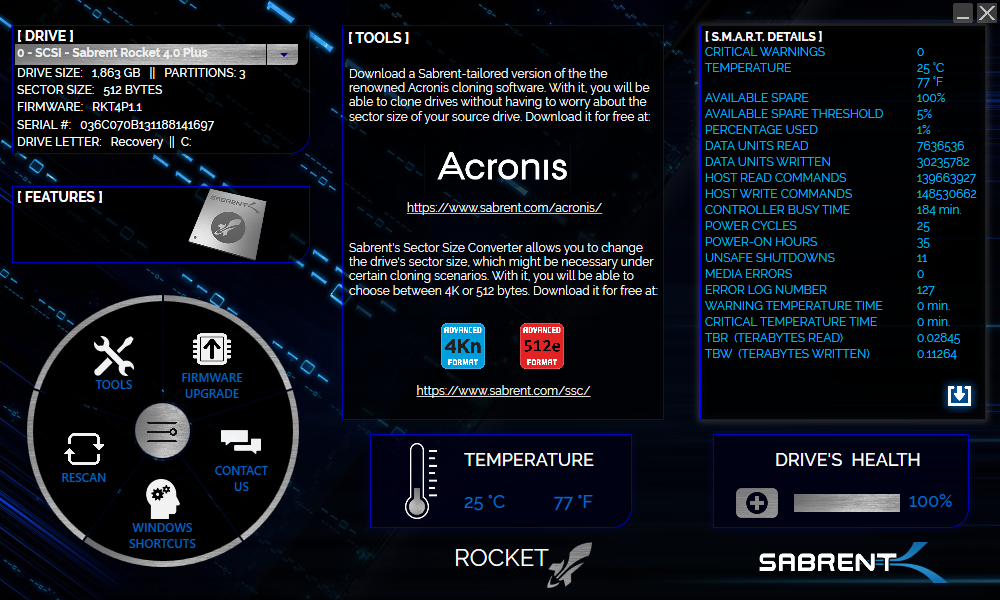
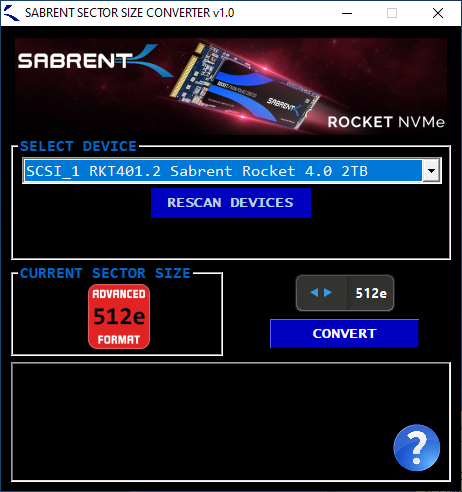
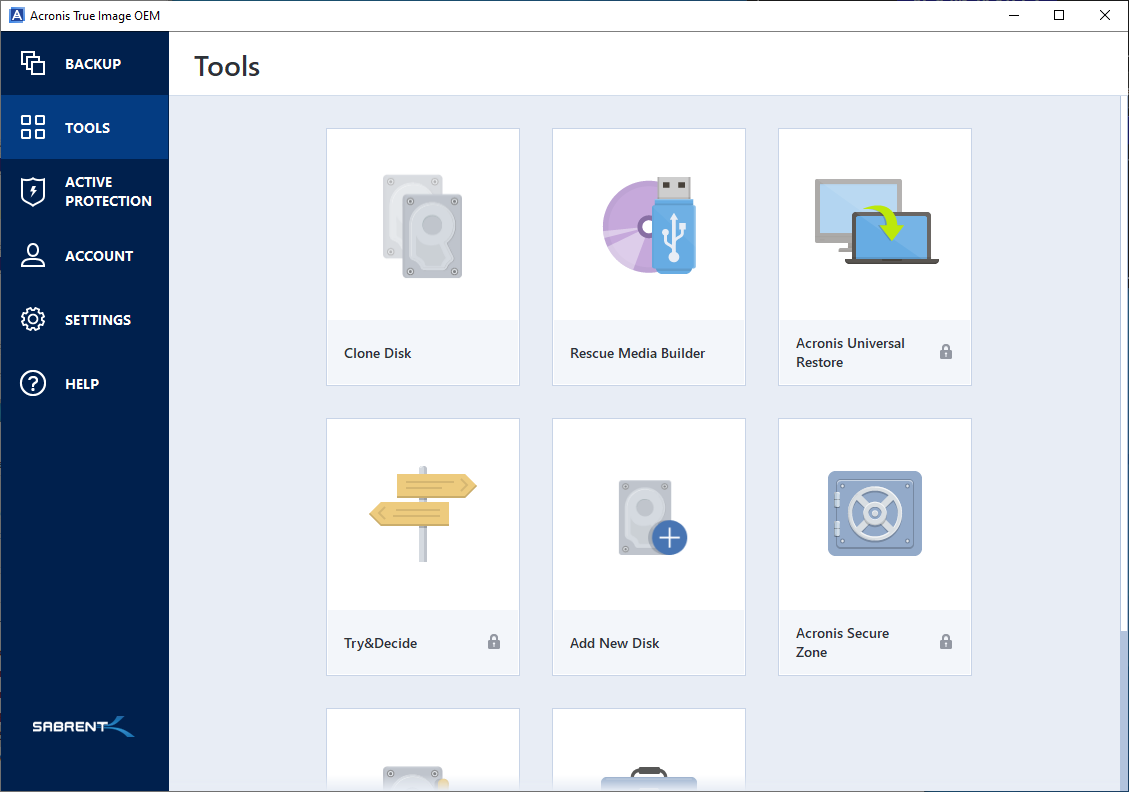
Sabrent provides Acronis True Image for Sabrent software to its customers for free and simple cloning. The company also provides a download for Sabrent Rocket Control Panel to monitor the device and update the firmware, if applicable. It also has the Sabrent Sector Size converter, enabling users to re-format between either 512-byte or 4K-byte sector sizes.
A Closer Look
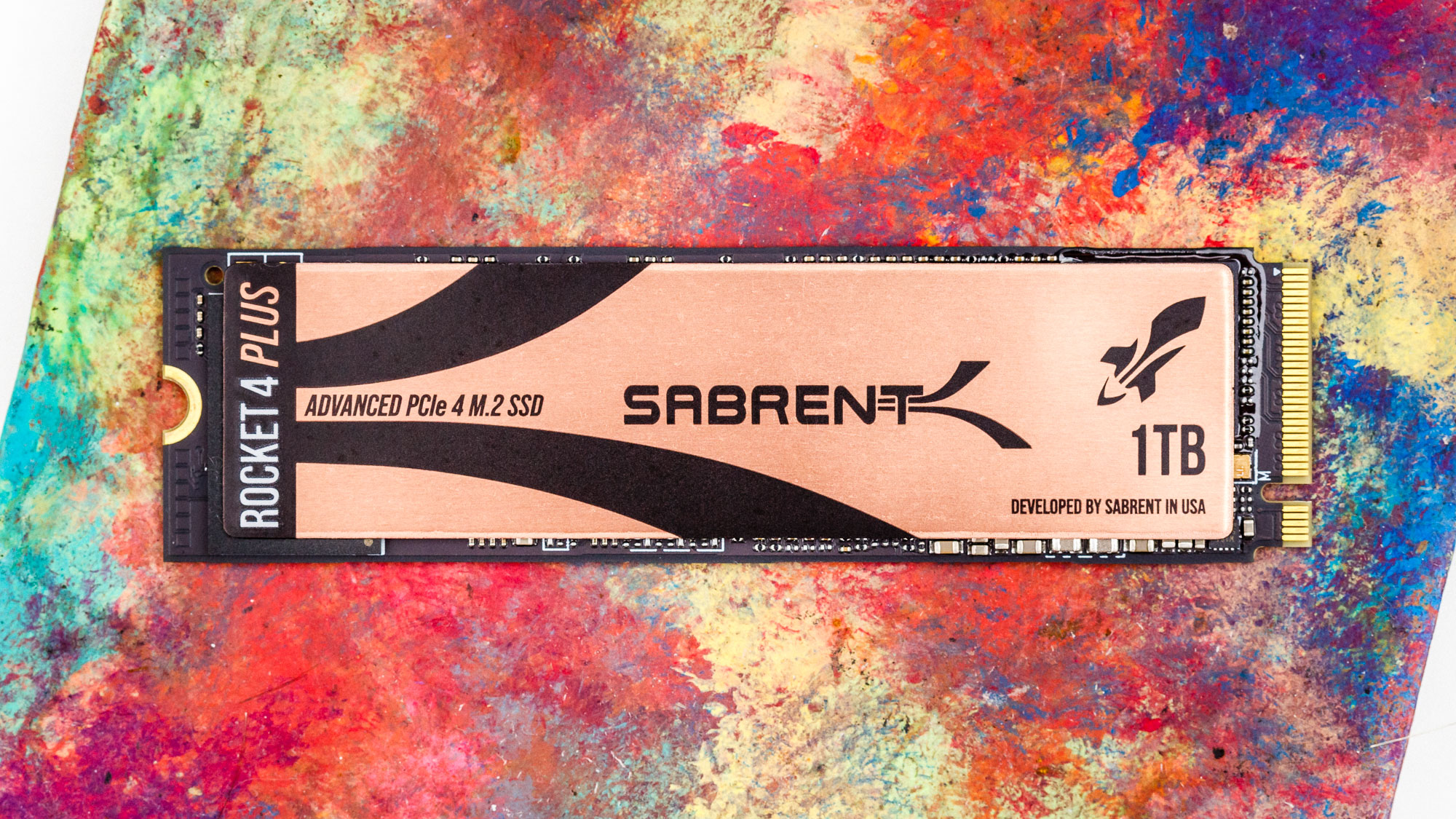
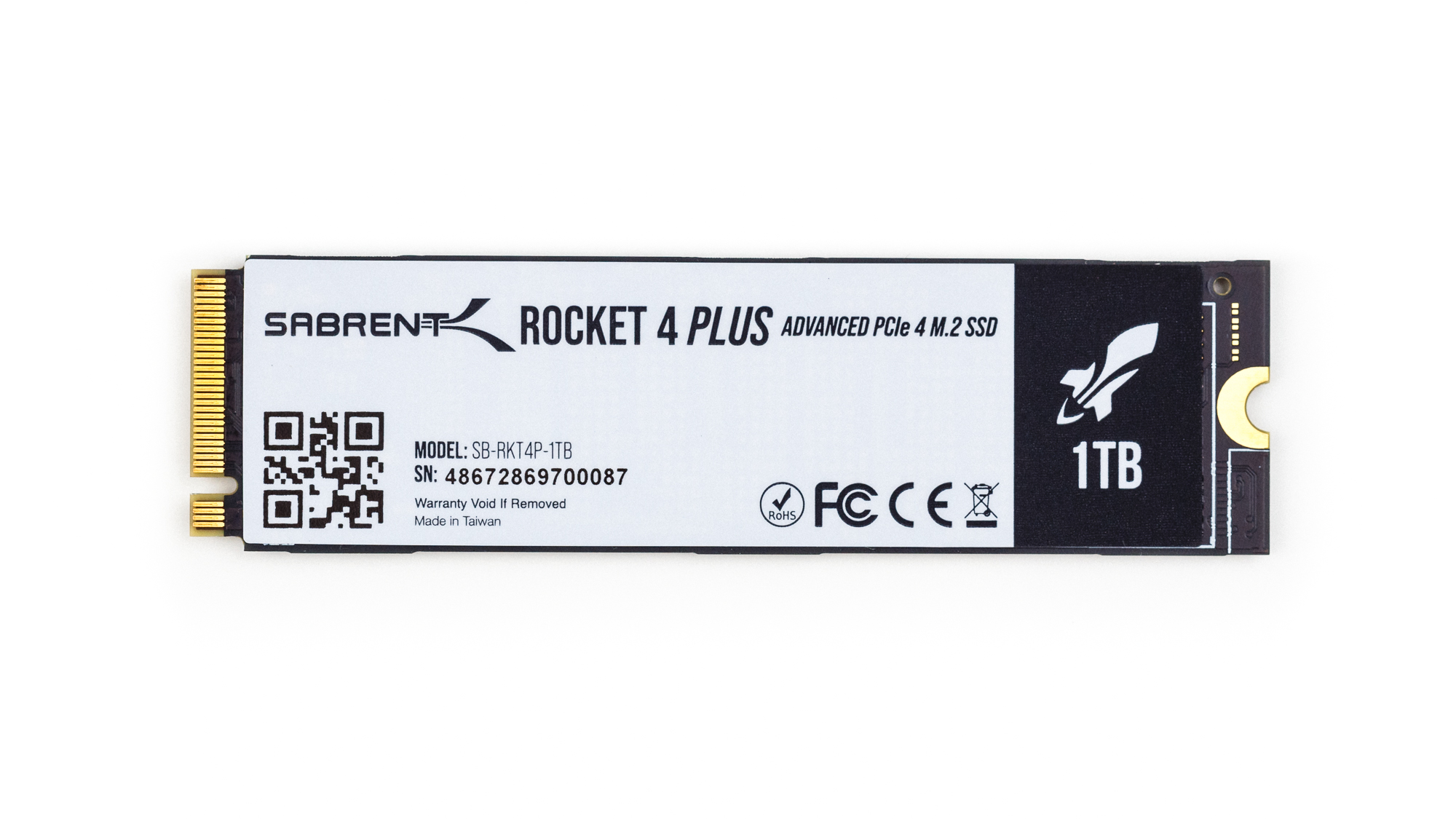
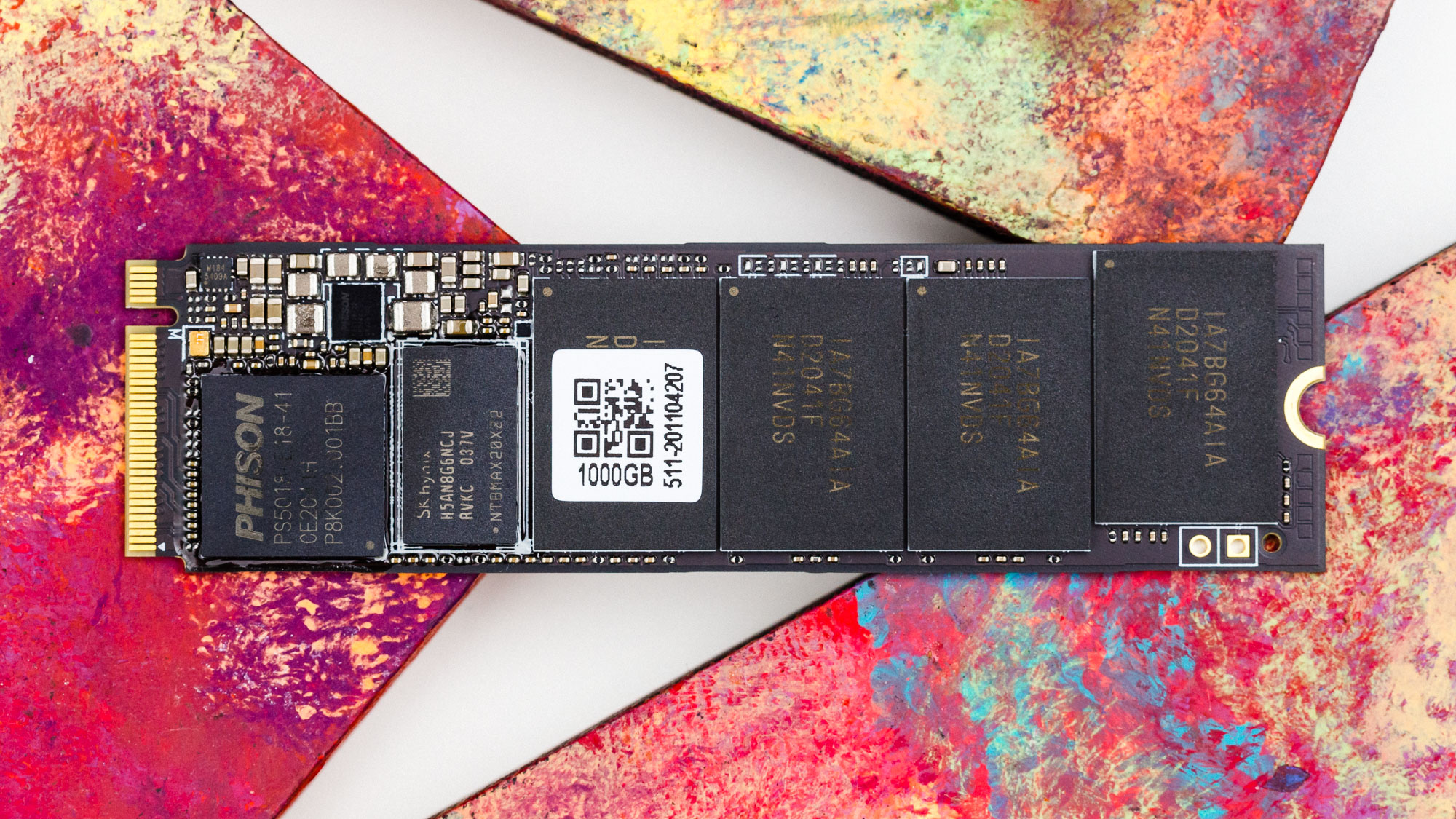
The Sabrent Rocket 4 Plus comes in an M.2 2280 form factor that is single-sided at 1TB and double-sided at 2TB and 4TB. With a slickly designed two-tone copper heat spreader overtop of a black PCB, the Sabrent Rocket 4 Plus is a looker for sure. Aesthetically, we think it is very appealing.
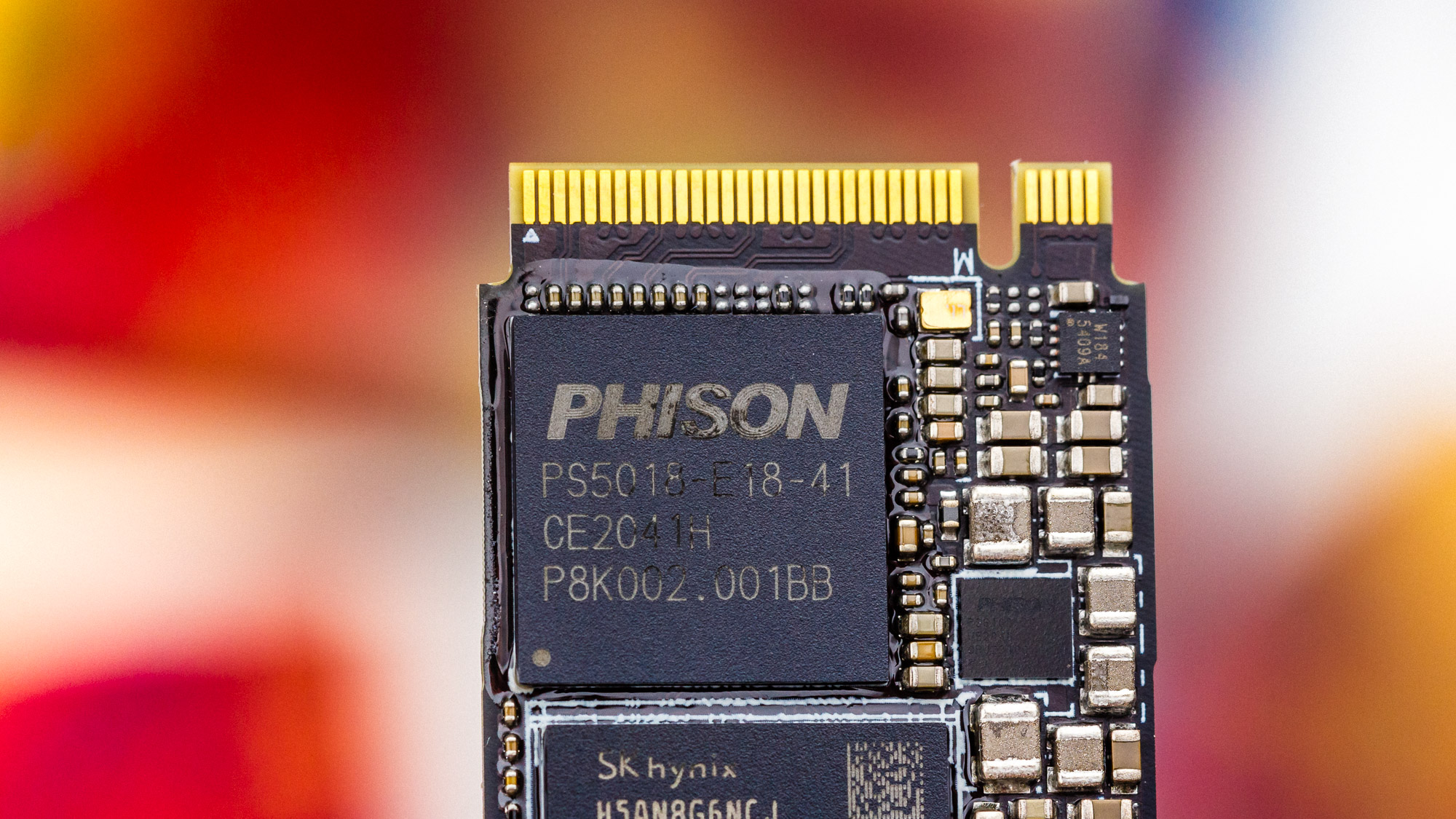
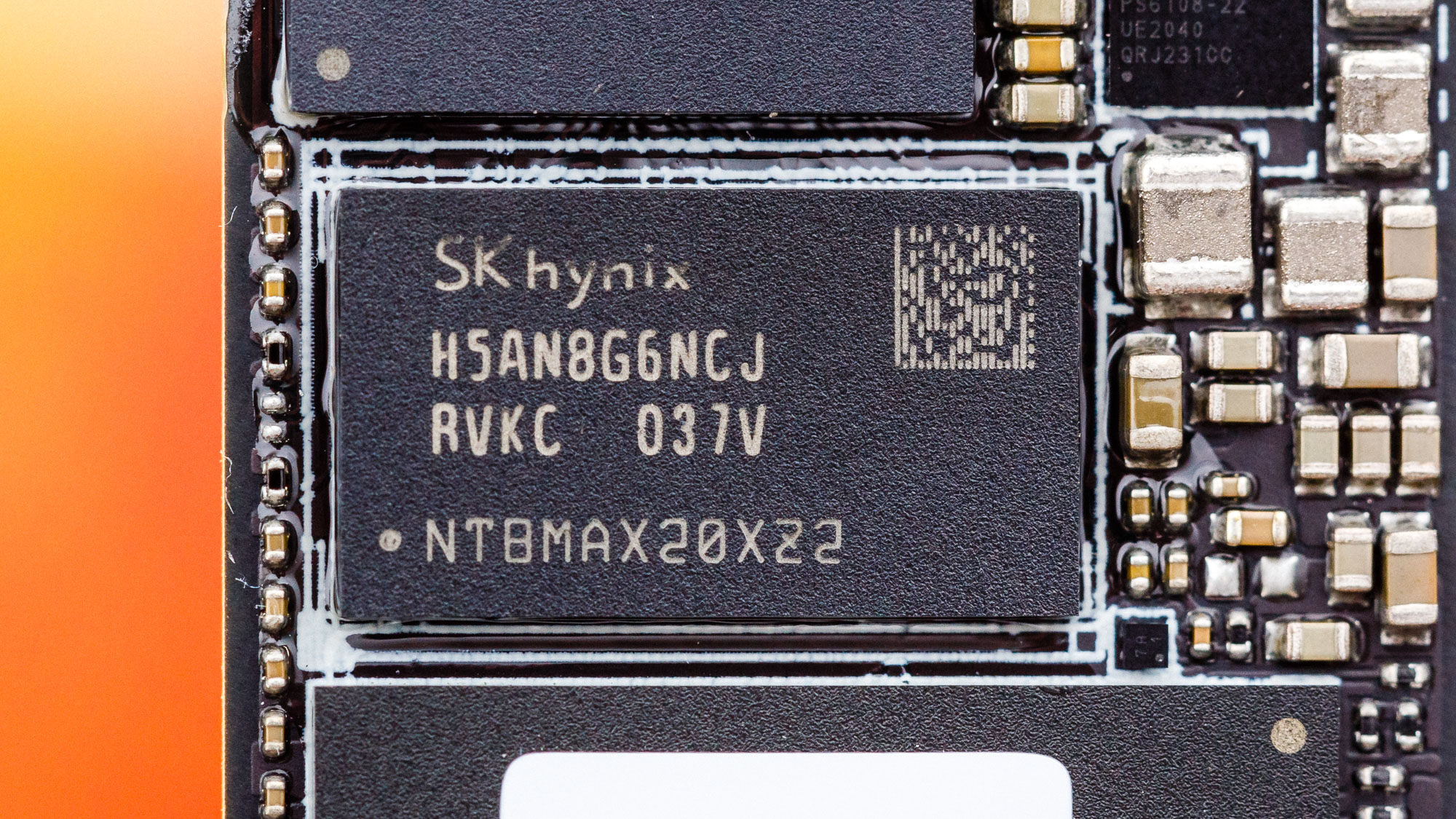
Phison’s PS5018-E18 powers the drive. The E18 is a top-of-the-line PCIe 4.0 x4 eight-channel NVMe 1.4 SSD controller manufactured on TSMC’s 12nm process for efficiency. It leverages five CPU cores in its design for high-speed address translation and optimized NAND control.
Three 32-bit Arm Cortex R5 CPU cores manage primary tasks, clocking in at 1GHz (36% faster than the Phison’s PS5016-E16’s cores) while the controller firmware offloads its proprietary Dual CoXProcessor 2.0 code to two lower-clocked cores to ensure consistent quality of service and efficiency. For further power management, the Rocket 4 Plus supports APST, ASPM, and the L1.2 standby power state as well as thermal throttling, currently with a 70 degrees Celsius hard limit.
Additionally, Phison’s E18 leverages a DRAM-based architecture to deliver responsive performance. For the task, Sabrent outfit the Rocket 4 Plus with SK hynix DDR4 DRAM ICs that operate at 1,600 MHz, the 1TB model having a single 1TB chip while the 2TB model comes with a 1TB chip on each side of the PCB.
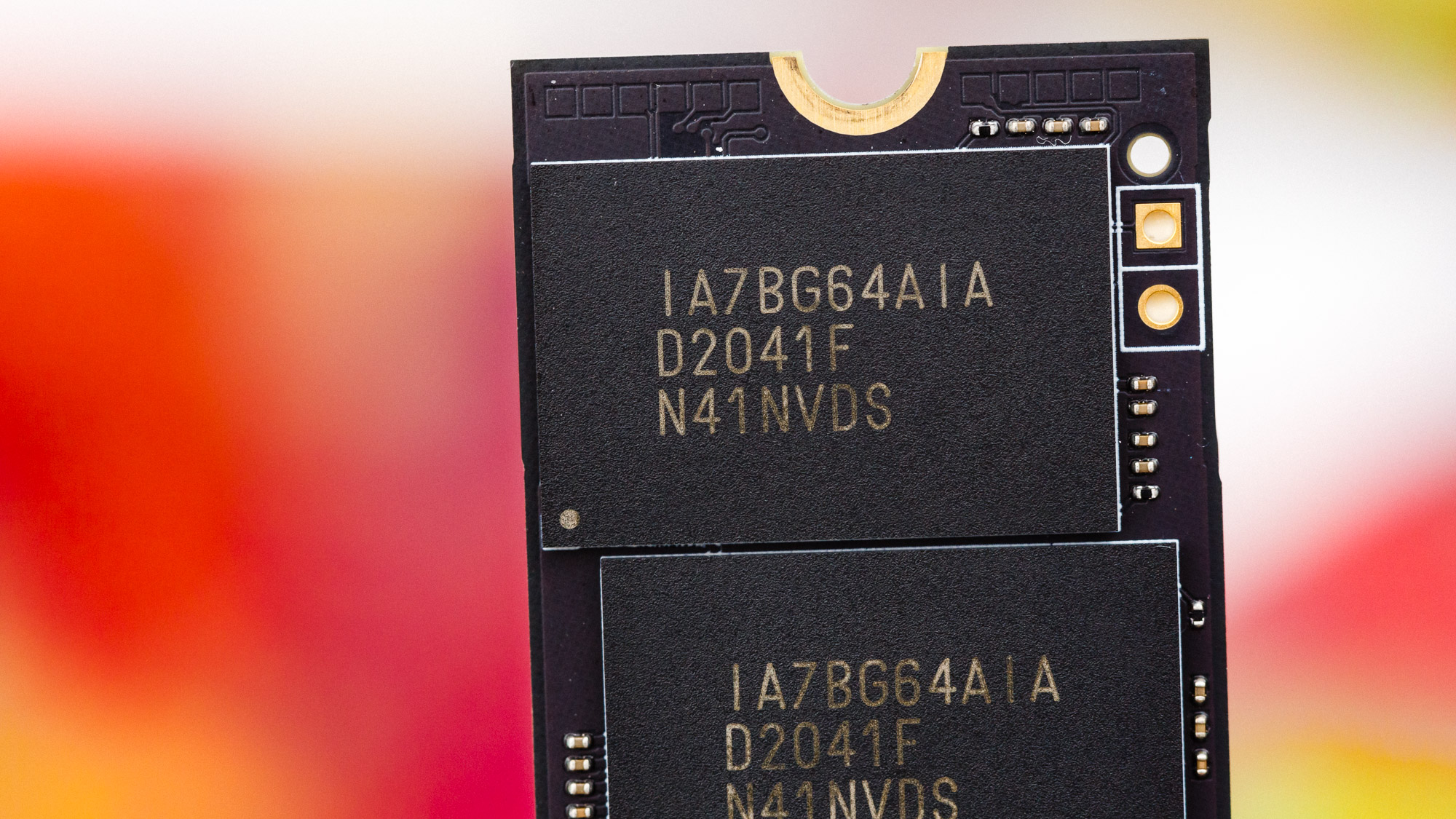
Sabrent opted to use Micron’s 512Gb 96L TLC NAND flash for the Rocket 4 Plus. This flash isn't quite as fast as Micron’s new 176L flash, but it is still very responsive. While the company’s last-generation Rocket NVMe 4.0 leveraged the Phison PS5016-E16 and BiCS4 96L flash that operated at 800 MTps, Micron’s 96L B27B flash on the Rocket 4 Plus interfaces with the new PS5018-E18 at speeds of up to 1,200 MTps.
Other than increased interface speeds, Micron’s flash features double the plane count of BiCS4 flash that came on Sabrent’s Rocket NVMe 4.0. While quad-plane in design, optimal interleaving isn’t realized until the 2TB capacity. The 1TB model leverages sixteen 512Gb dies while 2TB uses 32 dies, attaining a higher level of parallelism for improved performance over the smaller capacity.
MORE: Best SSDs
MORE: How We Test HDDs And SSDs
MORE: All SSD Content

Sean is a Contributing Editor at Tom’s Hardware US, covering storage hardware.
-
Alvar "Miles" Udell Remember when Samsung drives were the fastest AND the cheapest? 2021 and still well above the $100/TB level...Reply -
Chris Fetters Spends much of the review (& most of the conclusion) talking about how the 2TB model is able to get significantly more performance out of the new Phison E18 controller and as such, THAT'S the one you should buy... to then go and EXCLUSIVELY only show benchmark results of the 1TB drive in the review itself... -_- ... I am not amused.Reply -
seanwebster Reply
I reviewed both capacities at once, but the 2TB results will show in an update soon, painting a better picture.Chris Fetters said:Spends much of the review (& most of the conclusion) talking about how the 2TB model is able to get significantly more performance out of the new Phison E18 controller and as such, THAT'S the one you should buy... to then go and EXCLUSIVELY only show benchmark results of the 1TB drive in the review itself... -_- ... I am not amused. -
prolfe Reply
Sean,seanwebster said:I reviewed both capacities at once, but the 2TB results will show in an update soon, painting a better picture.
It sounds like you're saying you did all the work required to make a complete review, but decided to hold some back and get a second article out of it for those sweet sweet clicks. I'm a longtime toms reader and that won't change anytime soon. Also note that I didn't accuse you but rather said it sounds like a certain thing. If I'm correct it does sound a little shady. You didn't call the article "Rocket 4 Plus 1 TB Review" and didn't mention anywhere in the article that there was more data for the 2 TB coming. Also, it's not like the 2TB isn't out yet, so you can't say you're holding it back til the 2 TB comes out. I appreciate your work and thank you for writing this article. Please take the comment in the spirit it is given: as constructive criticism of a potential business practice that I personally find distasteful. I hope you'll consider refraining from this in the future. -
seanwebster Reply
I typically review one capacity at a time and then release another capacity at a later date because it takes longer to test. The 2TB's results were mostly done when I wrapped up the review, but I was having a little trouble with something, hence the delay. But, since the 2TB results will be published soon, and again, I already had the majority of my data, I wrote the conclusion based on both capacities from the getgo.prolfe said:Sean,
It sounds like you're saying you did all the work required to make a complete review, but decided to hold some back and get a second article out of it for those sweet sweet clicks. I'm a longtime toms reader and that won't change anytime soon. Also note that I didn't accuse you but rather said it sounds like a certain thing. If I'm correct it does sound a little shady. You didn't call the article "Rocket 4 Plus 1 TB Review" and didn't mention anywhere in the article that there was more data for the 2 TB coming. Also, it's not like the 2TB isn't out yet, so you can't say you're holding it back til the 2 TB comes out. I appreciate your work and thank you for writing this article. Please take the comment in the spirit it is given: as constructive criticism of a potential business practice that I personally find distasteful. I hope you'll consider refraining from this in the future. -
Makaveli Not liking the endurance drop from E16 drives at 1TB that do 1,800 TBW to now 700TBW.Reply
also the E16 Corsair MP600 has AES 256-bit encryption.
Waiting for your review of the Corsair Core and Pro models. -
prolfe Reply
Thanks for the explanation and glad to hear it was something completely understandable. You keep making good articles and I'll keep reading!seanwebster said:I typically review one capacity at a time and then release another capacity at a later date because it takes longer to test. The 2TB's results were mostly done when I wrapped up the review, but I was having a little trouble with something, hence the delay. But, since the 2TB results will be published soon, and again, I already had the majority of my data, I wrote the conclusion based on both capacities from the getgo. -
RedCat888 (HIGUYS9090) ReplyAlvar Miles Udell said:Remember when Samsung drives were the fastest AND the cheapest? 2021 and still well above the $100/TB level...
I mean you can get a 1TB NVME for $100, and even a 1TB sata drive for 80-90 bucks, it's just that the increase in speed makes it more expensive -
thdm Nice review update. I'd been looking at the 2TB Rocket 4 plus for a little while.Reply
My interest in this SSD was at least in part because I was planning to run it in a laptop (MacBook Pro 2015) and being PCIe 3.0 was hoping that even though it's overkill and has more cores driving high performance for PCIe 4.0, that being a 12nm finfet design fabbed at TSMC that it might pull off nicely reduced overall power than other solutions for PCIe3.0.
The Sabrent site seems to indicate one needs a heatsink if running with a PCIe4.0 board, implying PCIe3.0 does/might not?
Any chance you can run some comparisons on PCIe3.0 with power consumption numbers? One would hope that it beats at least well proven PCIe3.0 designs on 28nm -
escksu ReplyChris Fetters said:Spends much of the review (& most of the conclusion) talking about how the 2TB model is able to get significantly more performance out of the new Phison E18 controller and as such, THAT'S the one you should buy... to then go and EXCLUSIVELY only show benchmark results of the 1TB drive in the review itself... -_- ... I am not amused.
IMHO, don't go too crazy over benchmarks. Unless you have more than 1 drive in your system, you will only be either transferring from/to RAM or another partition within the same drive.
You won't find windows or your apps loading much faster than even PCIE 3.0 drive (itself isn't really alot faster than SATA in daily usage cases.).